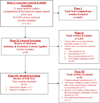Psychosocial impact of lymphedema: a systematic review of literature from 2004 to 2011
- PMID: 23044512
- PMCID: PMC4153404
- DOI: 10.1002/pon.3201
Psychosocial impact of lymphedema: a systematic review of literature from 2004 to 2011
Abstract
Objective: This systematic review aimed to evaluate the level of evidence of contemporary peer-reviewed literature published from 2004 to 2011 on the psychosocial impact of lymphedema.
Methods: Eleven electronic databases were searched and 1311 articles retrieved; 23 met inclusion criteria. Twelve articles utilized qualitative methodology and 11 used quantitative methodology. An established quality assessment tool was used to assess the quality of the included studies.
Results: The overall quality of the 23 included studies was adequate. A critical limitation of current literature is the lack of conceptual or operational definitions for the concept of psychosocial impact. Quantitative studies showed statistically significant poorer social well-being in persons with lymphedema, including perceptions related to body image, appearance, sexuality, and social barriers. No statistically significant differences were found between persons with and without lymphedema in the domains of emotional well-being (happy or sad) and psychological distress (depression and anxiety). All 12 of the qualitative studies consistently described negative psychological impact (negative self-identity, emotional disturbance, and psychological distress) and negative social impact (marginalization, financial burden, perceived diminished sexuality, social isolation, perceived social abandonment, public insensitivity, and non-supportive work environment). Factors associated with psychosocial impact were also identified.
Conclusions: Lymphedema has a negative psychosocial impact on affected individuals. The current review sheds light on the conceptualization and operationalization of the definitions of psychosocial impact with respect to lymphedema. Development of a lymphedema-specific instrument is needed to better characterize the impact of lymphedema and to examine the factors contributing to these outcomes in cancer and non-cancer-related populations.
Keywords: cancer; lymphedema; oncology; psychological distress; psychosocial; systematic review.
Copyright © 2012 John Wiley & Sons, Ltd.
Figures
References
-
- Lawenda BD, Mondry TE, Johnstone PAS. Lymphedema: A primer on the identification and management of a chronic condition in oncologic treatment. CA: A Cancer Journal for Clinicians. 2009;59:8–24. - PubMed
-
- Mak SS, Mo KF, Suen JJS, Chan SL, Ma WL, Yeo W. Lymphedema and quality of life in Chinese women after treatment for breast cancer. European Journal of Oncology Nursing. 2009;13:110–115. - PubMed
-
- Cormier JN, Askew RL, Mungovan KS, Xing Y, Ross MI, Armer JM. Lymphedema beyond breast cancer. Cancer. 2010;116:5138–5149. - PubMed
Publication types
MeSH terms
Grants and funding
LinkOut - more resources
Full Text Sources
Medical
Miscellaneous


